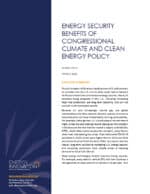The Ukraine invasion has led policymakers to consider how the U.S. and its allies could reduce demand for Russian fossil fuels and increase energy security. Increasing domestic oil production is not a short-term solution as it will take years to significantly ramp up production. Fortunately, new Energy Policy Simulator modeling finds the climate and clean energy provisions currently under consideration in the U.S. Congress would reduce annual U.S. oil consumption by 180 million barrels per year by 2030, or roughly twice current U.S. imports of Russian oil, with half of the reductions achieved by 2025. Clean energy deployment and electrification of buildings and industry would similarly reduce U.S natural gas consumption by 4.7 trillion cubic feet per year by 2030, or roughly equal to 85 percent of the EU’s 5.5 trillion cubic feet of imported Russian natural gas in 2021. These climate provisions would also help cut U.S. greenhouse gas emissions by up to 1.2 gigatons in 2030.
Energy Security Benefits of Congressional Climate and Clean Energy Policy
New EPS modeling finds climate provisions under consideration in Congress would significantly lessen U.S. dependence on foreign oil and gas. By 2027, total reductions would be larger than U.S. demand for Russian oil in 2021, with about half the reduction achieved by 2025. Similarly, U.S natural gas consumption would be reduced 4.7 trillion cubic feet per year by 2030, or roughly equal to 85 percent of the EU’s 5.5 trillion cubic feet of imported Russian natural gas in 2021.

